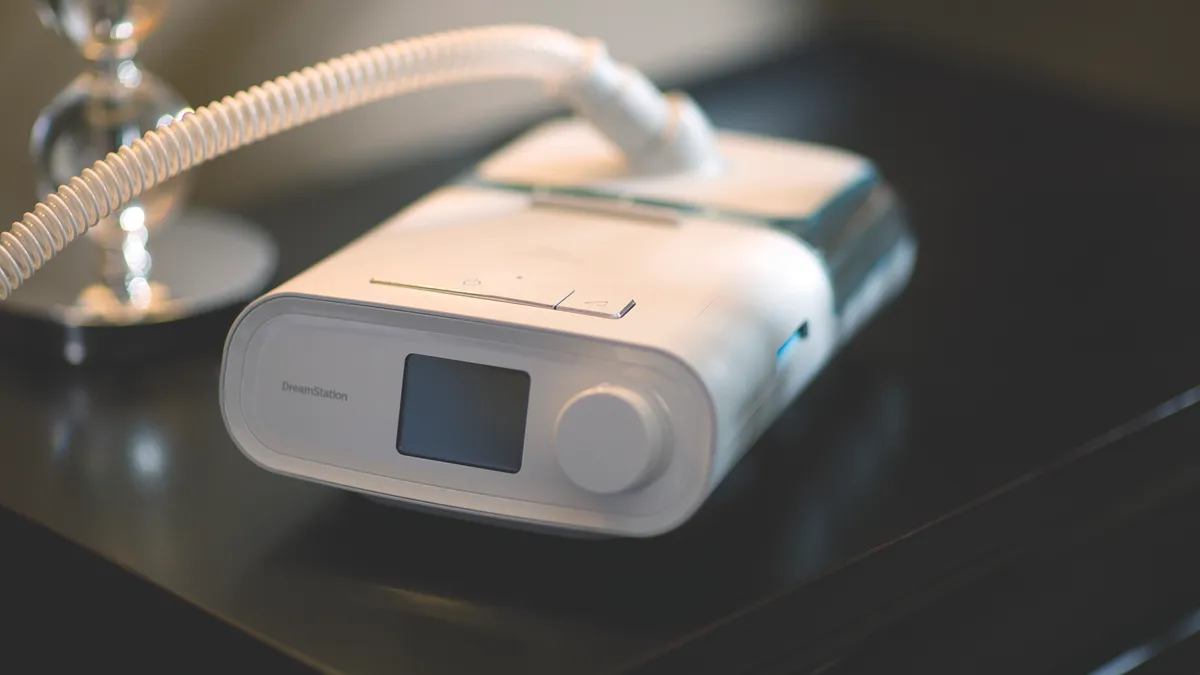Dive Brief:
- Philips shared results of a third-party risk assessment of its recalled sleep apnea machines, which found that potential patient exposure to foam particles or volatile organic compounds while using the devices “is unlikely to result in an appreciable harm to health in patients.”
- Philips shared the data with the Food and Drug Administration, and cautioned that the regulator may reach a different conclusion. The FDA has said the risks of inhaling the foam include irritation to the skin, eyes, nose, and respiratory tract; asthma; and toxic or cancer-causing effects.
- Attorneys representing patients suing Philips over the recall called the results “PR spin masquerading as research.”
Dive Insight:
Philips continues to push back against claims that the foam breakdown from its recalled sleep apnea devices poses a health risk to patients. The company is currently replacing or repairing more than five million sleep apnea devices and ventilators recalled because of the breakdown of polyester-based polyurethane foam used to soundproof the devices.
On Tuesday, Philips said it had finished risk assessments of its CPAP and BiPAP machines, which account for 95% of the recalled devices. Testing included a mixture of new, used and lab-aged devices.
CEO Roy Jakobs said the results of the third-party risk assessment were “positive and encouraging,” adding that the company has focused on the test and research program “to gain more clarity about the safety of the affected devices” and on providing replacement devices to patients.
The test results did not change Philips’ recommendations to patients with a recalled device, which include registering the devices for remediation and talking to their doctors about their options, including whether to continue to use the recalled device or switch to another one.
“Philips continues to desperately try to downplay the issue and the health risks consumers face as a result,” the plaintiffs’ attorneys wrote in an email. They said the testing “lacks any credibility and is yet another shameless attempt by Philips to cast blame for the dangers found in its now-recalled breathing devices that pumped degraded foam and chemicals into patients.”
They added that the FDA has criticized prior studies completed by the company as “not adequately performed to identify or detect quality problems,” and the new data suffers from the same flaws and bias.
“Thousands of patients who put their trust in Philips are suffering from cancer and respiratory illnesses, while millions more are forced to rely on the company’s dangerously defective devices while waiting for a replacement," they wrote.
The plaintiff attorneys include Sandra L. Duggan of Levin Sedran & Berman, Kelly K. Iverson of Lynch Carpenter LLP, Christopher A. Seeger of Seeger Weiss, and Steven A. Schwartz of Chimicles Schwartz Kriner & Donaldson-Smith.
Philips has been running a test and research program on PE-PUR foam, working with five independent laboratories, to better assess potential health risks, spokesperson Steve Klink wrote in an email. Per a 518(a) order issued by the FDA in March of 2022, Philips must provide access to information about available test data.
Philips has confidence in the testing methodology and results, Klink added, noting that the test methods meet applicable ISO standards, and the laboratories conducting them are making their own independent assessment of the test results.
The company said it has remediated a total of about 4.3 million devices in the recall, including 2.3 million devices in the U.S.
Philips has faced pushback from regulators for its handling of the recall, with the FDA last month saying the company had sent “considerably less” replacement or repaired devices to U.S. consumers than the 2.46 million posted on its website.
The company is also in consent decree talks with the U.S. Department of Justice. In an April earnings call, Jakobs said he still hopes for a “quick resolution,” in response to a question about the company’s previous prediction that an agreement could be reached by the second quarter. “We are not in control of that timeline,” he added.
This article has been updated with additional comments from Philips.











